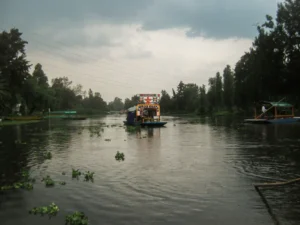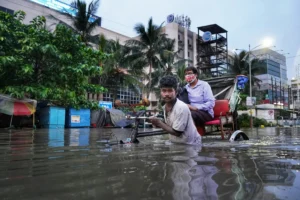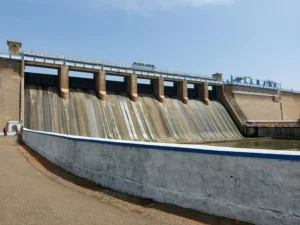Introduction
In 2025, Punjab has faced a lot of difficulties due to the natural disaster caused by the rain. People have lost their lives due to the floods caused by the rains, but they have suffered a lot, the compensation for which is difficult to find. Due to this Punjab Flood, people’s crops and their work, along with real estate, have also suffered a lot, and is it possible to compensate for it now?
According to the sources, it has been found that 1400 villages have been submerged in water, “more than 1,75,216 hectares of crops” have been destroyed, and 3,55,000 people have been affected by this.
News on Air (Official Government)
This has raised many new questions for homebuyers and investor developers. Like, which area will be right for investors to invest in now? What kind of a deal should investors and buyers work together on? What kind of a deal will the state and builders have with each other for the flood? Communities?
1.Punjab Floods 2025: The Ground Reality
Punjab has been facing devastating floods for almost four decades. For this reason many villages and cities are facing a disastrous impact. Monsoon rains have inundated 23 districts and more than 1,400 villages. Due to this, nearly 3.55 lakh residents have been directly affected, and thousands of people have been forced to live in disaster camps.

District-wise Impact Analysis:The impact of the flood was felt in many different areas. In Gurdaspur 324 villages were most affected. After that, Amritsar (190 villages), Kapurthala (123 villages), Hoshiyarpur (121 villages), and Firozpur (111 villages) were affected. In these five districts, almost 60% of the total affected villages were affected.
Agricultural Devastation:There has been a huge loss in the Agriculture region. 1,75,216 hectares of agricultural land owned by the farmers have been destroyed. In Gurdaspur alone, 40,169 hectares, and in Manasa and Amritsar, 24,967 hectares and 23,000 hectares of land have been destroyed. This devastation in the Agricultural Region represents a loss of billions of dollars for the farmers and the country and is a threat to food security.
Agricultural Damage Assessment
Human Cost: Approx 29-30 people have lost their lives in various districts due to the floods, and rescue operations are still underway for the safety of people. The government has established over Multiple relief camps with support from NDRF, the Army, and state disaster management teams, conducting mass evacuations from the worst-hit areas.
2.Immediate Impact on Real Estate
The Punjab flood in 2025 has affected not only the people of Punjab but also its real estate market. Along with real estate, property buyers, sellers, and investors are still facing many challenges as this disaster has changed the dynamics of both demand and price in the districts.

Property Value Decline in Affected Areas
Property prices have fallen sharply in the lower areas and worst-affected villages of Punjab. People’s homes and pieces of land, which once attracted many buyers, are now considered high-risk areas.
Many potential investors are shying away from investing due to fear of long-term losses and future risks. This sudden drop in demand has slowed down lending and borrowing in these areas. And it’s loss is being seen a lot in real estate as well.
India Water Portal – Flood FAQ
3.Rental Demand Surge in Safe Zones
Due to the damage caused by the flood in Punjab, people in their houses, towns, and low-lying colonies have suffered a lot. Now they will have to shift to rented houses and colonies to live, due to which the demand for rent is increasing and there is a possibility of increase in rent too, and it is being increased as well.
1.Project Delays and Approvals: Ongoing housing projects near rivers and canals face construction delays due to waterlogging, transport disruptions, and stricter government inspections.
2.Insurance and Lending Pressure: Banks and insurers are tightening policies. Future property loans in flood-prone belts may require mandatory flood insurance, increasing the cost burden on buyers.
3.Land Conversion Impact: Agricultural land near rivers that was earlier attractive for farmhouses or resorts is now being re-evaluated, with reduced investor interest.
4.Long-Term Consequences for Punjab’s Property Market: The 2025 floods are likely to bring structural shifts in how people view and invest in Punjab real estate:
Shift Towards Elevated Areas: Buyers will now prefer land and housing projects in higher altitudes and are becoming more interested.
5.Demand for Climate-Resilient Homes: The developments that will provide low-lying platforms, modern water drainage systems, and other anti-corruption materials will attract more customers.
Check also : Top Listings, Guide and Buying Guide
4.Government Regulation
Now, Because of this situation flood, there may be a change in the zoning laws of the area. To prevent such an incident from happening again, the banks of rivers like the Beas, Ravi, and Sutlej should now be taken care of properly.

Urban Growth Acceleration: Towns like Pathankot, Ludhiana, Jalandhar, high-rises, and Chandigarh peripheries may see faster real estate growth due to safety perceptions.
Also read : UP Awas Vikas Housing Scheme 2025 | UP Housing and Development Board
5.Government Policies and Future Safeguards
After the flood that occurred in Punjab in 2025, the State Government and Central Government have started taking comprehensive measures to prevent future disasters.

- Rebuilding flood-affected villages. Along with water resource-friendly housing, 1,400 affected villages are being reconstructed with low-cost infrastructure, an advanced water drainage system, and improved road materials. So that one does not have to face these problems again, the most affected districts like Guradasapar (324 villages), Amritsar (190 villages), and Kapoorathala (123 villages) are being given priority.
- Strengthening embankments. A comprehensive beautification work is underway on the banks of the major rivers – Byas, Ravine, and Sutlej rivers, which also includes the establishment of pre-emptive systems and automatic flood control systems to prevent the breaking of the dams again in the future.
- Introducing stricter floodplain regulations -Now, under the new zoning laws, restrictions will be imposed on construction within a radius of 200 meters from the riverbank. As per the new building construction rules, now for all new constructions, wide-road design, appropriate standards, and uniform water management are mandatory.
- Expanding crop and property insurance schemes -Improved insurance coverage for the agricultural sector (for 1,75,216 hectares of Agricultural land of the perished farmers) and property owners, which will benefit them and will include a faster claim process and an increase in compensation rates. And the government is considering reducing the GST so that people can benefit more.
Also read : Home Loans in India Over the Last 5 Years – Key Trends
For real estate investors and Shubhdeep-Infra buyers, these government initiatives translate into better infrastructure development, stricter but more predictable zoning regulations, and ultimately safer investment avenues in the coming years. Properties adhering to new flood-resistant standards will likely command premium pricing and attract serious investors looking for long-term security.
Conclusion :
The disaster that hit Punjab in 2025 is a challenge. More than 1,400 villages have been submerged, more than “1,75,216 hectares” of crops have been destroyed, and 3,55,000 people have been displaced. This disaster has completely changed people’s perspective towards land and housing.
Still, history is witness that Punjab and its people have always rebuilt with great vigor. For real estate investors and home buyers, this is a great opportunity to look for secure areas, durable accommodation, and long-term, valuable investments.
With the right strategy, Punjab’s property market will not only flourish but will also develop into a more water-efficient and future-ready market.
*Sources:
– Government of Punjab Official Reports
– National Disaster Response Force (NDRF)
– Punjab State Disaster Management Authority
– India Meteorological Department (IMD)
– Press Information Bureau (PIB)
Frequently Asked Questions
How many villages were affected by Punjab floods in 2025?
Over 1,400 villages across 23 districts were affected by the 2025 floods. Gurdaspur was the worst hit with 324 villages, followed by Amritsar (190 villages), Kapurthala (123 villages), Hoshiyarpur (121 villages), and Firozpur (111 villages).
What is the total agricultural land damaged in Punjab floods?
Approximately 1,75,216 hectares (1.75 lakh hectares) of agricultural land has been destroyed. Gurdaspur alone lost 40,169 hectares, while Manasa and Amritsar lost 24,967 hectares and 23,000 hectares respectively.
How have property prices changed after the floods?
Property prices have fallen sharply in flood-affected and low-lying areas, with many becoming high-risk zones. However, elevated and safer areas are seeing increased demand, leading to price stability or even increases in these zones.
Which areas are safe for property investment post-floods?
Towns like Pathankot, Ludhiana, Jalandhar, and Chandigarh peripheries are considered safer due to higher elevation and better drainage infrastructure. Properties in areas 200+ meters from riverbanks are also preferred.
Should I buy flood insurance for my property in Punjab?
Yes, banks and insurers are now requiring mandatory flood insurance for properties in flood-prone areas. This adds to the cost but provides essential protection against future disasters.
Is it a good time to invest in Punjab real estate now?
Yes, for informed investors. The market presents unique opportunities with lower prices in recovering areas and high demand in safe zones. However, thorough area analysis and expert consultation are essential.
How can Shubhdeep-Infra help with flood-safe property investments?
Shubhdeep-Infra specializes in identifying flood-resistant locations for industrial land, warehouses, and hotels. We provide site analysis, risk assessment, legal support, and investment guidance based on our extensive Punjab market expertise.
Get Expert Investment Consultation:
📞 Call Now: +91-9906272262
📧 Email: Rajan@shubhdeepinfra.com
📍 Visit Us: Bahu Plaza, Jammu, Jammu & Kashmir, India – 180012
